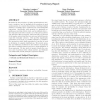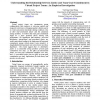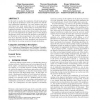382 search results - page 55 / 77 » Proof Theory for Distributed Knowledge |
139
click to vote
ICS
2010
Tsinghua U.
15 years 6 months ago
2010
Tsinghua U.
: Perhaps the two most significant theoretical questions about the programming of self-assembling agents are: (1) necessary and sufficient conditions to produce a unique terminal a...
102
click to vote
SIGECOM
2009
ACM
15 years 9 months ago
2009
ACM
Motivated by the prevalence of online questionnaires in electronic commerce, and of multiple-choice questions in such questionnaires, we consider the problem of eliciting truthful...
HICSS
2008
IEEE
15 years 9 months ago
2008
IEEE
Virtual project teams are spontaneous group configurations that endeavor to overcome spatial and temporal restrictions in bringing together distant experts to create just-in-time ...
162
click to vote
CIKM
1994
Springer
15 years 6 months ago
1994
Springer
We investigate the semantics for Knowledge Query Manipulation Language KQML and we propose a semantic framework for the language. KQML is a language and a protocol to support comm...
117
click to vote
DIALM
2008
ACM
15 years 4 months ago
2008
ACM
In this work we analyze the complexity of local broadcasting in the physical interference model. We present two distributed randomized algorithms: one that assumes that each node ...



